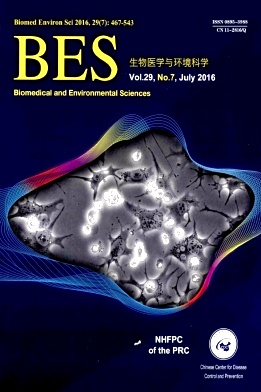Autophagy Attenuates MnCl2-induced Apoptosis in Human Bronchial Epithelial Cells
doi: 10.3967/bes2016.065
-
Key words:
- Manganese chloride /
- Apoptosis /
- Mitochondrial membrane potential /
- Autophagy /
- 16HBE cells
Abstract: Objective To investigate the role of autophagy in MnCl2-induced apoptosis in human bronchial epithelial 16HBE cells.
Methods Cell proliferation was measured by MTT assay. Mitochondrial membrane potential (MMP) and apoptosis were measured by flow cytometry. Autophagic vacuoles were detected by fluorescence microscopy. Cellular levels of apoptosis and autophagy-related proteins were measured by western blotting.
Results 16HBE cell proliferation was inhibited by MnCl2 in a dose- and time-dependent manner. MnCl2-induced 16HBE cell growth inhibition was related to MMP depolarization prior to the induction of apoptosis. Our data revealed that MnCl2-induced apoptosis in 16HBE cells was mediated by decreased expression of Bcl-2 and increased levels of cleaved caspase-3. It was observed that when we exposed 16HBE cells to MnCl2 in a dose-dependent manner, the formation of autophagic vacuoles and the levels of LC-3B-II were elevated. RNA interference of LC3B in these MnCl2-exposed cells demonstrated that MMP loss and apoptosis were enhanced. Additionally, the pan-caspase inhibitor Z-VAD-FMK increased the cellular levels of Bcl-2 and decreased apoptosis, but did not affect the cellular levels of LC3B in MnCl2-treated 16HBE cells.
Conclusion MnCl2 dose- and time-dependently inhibits 16HBE cell proliferation and induces MMP loss and apoptosis. Autophagy acts in a protective role against MnCl2-induced apoptosis in 16HBE cells.
| Citation: | YUAN Zhun, YING Xian Ping, ZHONG Wei Jian, TIAN Shi Min, WANG Yu, JIA Yong Rui, CHEN Wen, FU Juan Ling, ZHAO Peng, ZHOU Zong Can. Autophagy Attenuates MnCl2-induced Apoptosis in Human Bronchial Epithelial Cells[J]. Biomedical and Environmental Sciences, 2016, 29(7): 494-504. doi: 10.3967/bes2016.065 |







 Quick Links
Quick Links
 DownLoad:
DownLoad: